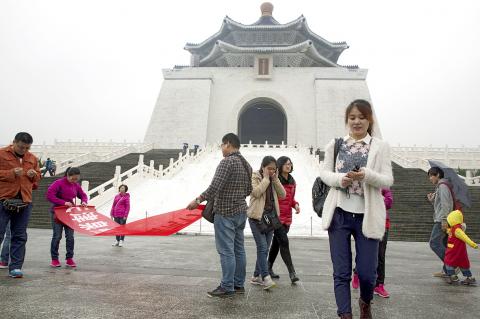Taipei’s Chiang Kai-shek Memorial Hall should be transformed into a research center and museum for all of the nation’s presidents, New Power Party (NPP) caucus whip Hsu Yung-ming (徐永明) said yesterday, adding that the memorial’s name could be temporarily preserved alongside the statue of former president Chiang Kai-shek (蔣介石).
“Having a memorial dedicated to this one leader isn’t appropriate because we don’t have any other similar memorials. It would be better to start dedicating the site to all former presidents and transition content to remove all traces of the authoritarian tradition of reverence to Chiang Kai-shek,” Hsu said, adding that he had already submitted an amendment to the Organization Act of National Chiang Kai-shek Memorial Management Office (國立中正紀念堂管理處組織法), which the legislature’s Procedure Committee is expected to address on Tuesday.
The amendment would expand the memorial’s mandate to include the preservation and exhibition of artifacts from all of the nation’s former presidents, along with research into the nation’s democratization process.

Photo: AP
The hall is charged only with preserving and presenting artifacts related to Chiang, although it is also permitted to hold artistic exhibitions.
“Because the site is conveniently located in Taipei’s city center, for it to be devoted only to Chiang is a waste,” Hsu said, adding that the site could continue to move in the direction of becoming a general exhibition center, while also serving as a depository for the documents of the nation’s past presidents, taking advantage of its location next to the National Central Library.
The imposing memorial complex occupies more than 25 hectares, with a 76m-tall central monument which was the nation’s second-tallest building when it was completed in 1980, falling just short of the Grand Hotel in Taipei.
The Academica Historica’s existing museum for past presidents could be integrated with the memorial hall if the amendment is passed, Hsu added.
He rejected calls to tear down the memorial hall from some past victims of human rights abuses perpetrated under Chiang’s decades-long rule, while adding that transitioning the content could help create consensus for further change.
“Only discussing a name change or whether to keep the memorial would only create pan-blue and pan-green conflict, so we want to focus on content, because there are both pan-blue and pan-green former presidents. We’ve even considered including presidents of the Republic of China before it moved to Taiwan, so the memorial could continue to count as a presentation of Republic of China history,” he said. “As far as I am concerned, as long as our amendment passes, it would even be acceptable for Chiang’s huge bronze statue to remain, because it has an educational function.”
The administration of former Democratic Progressive Party president Chen Shui-bian (陳水扁) sought to tear down the site’s perimeter marble wall and controversially renamed it “National Taiwan Democracy Memorial Hall,” only to see the name changed back when former Chinese Nationalist Party (KMT) president Ma Ying-jeou (馬英九) came to power in 2008.

An essay competition jointly organized by a local writing society and a publisher affiliated with the Chinese Communist Party (CCP) might have contravened the Act Governing Relations Between the People of the Taiwan Area and the Mainland Area (臺灣地區與大陸地區人民關係條例), the Mainland Affairs Council (MAC) said on Thursday. “In this case, the partner organization is clearly an agency under the CCP’s Fujian Provincial Committee,” MAC Deputy Minister and spokesperson Liang Wen-chieh (梁文傑) said at a news briefing in Taipei. “It also involves bringing Taiwanese students to China with all-expenses-paid arrangements to attend award ceremonies and camps,” Liang said. Those two “characteristics” are typically sufficient

A magnitude 5.9 earthquake that struck about 33km off the coast of Hualien City was the "main shock" in a series of quakes in the area, with aftershocks expected over the next three days, the Central Weather Administration (CWA) said yesterday. Prior to the magnitude 5.9 quake shaking most of Taiwan at 6:53pm yesterday, six other earthquakes stronger than a magnitude of 4, starting with a magnitude 5.5 quake at 6:09pm, occurred in the area. CWA Seismological Center Director Wu Chien-fu (吳健富) confirmed that the quakes were all part of the same series and that the magnitude 5.5 temblor was

The brilliant blue waters, thick foliage and bucolic atmosphere on this seemingly idyllic archipelago deep in the Pacific Ocean belie the key role it now plays in a titanic geopolitical struggle. Palau is again on the front line as China, and the US and its allies prepare their forces in an intensifying contest for control over the Asia-Pacific region. The democratic nation of just 17,000 people hosts US-controlled airstrips and soon-to-be-completed radar installations that the US military describes as “critical” to monitoring vast swathes of water and airspace. It is also a key piece of the second island chain, a string of

The Central Weather Administration has issued a heat alert for southeastern Taiwan, warning of temperatures as high as 36°C today, while alerting some coastal areas of strong winds later in the day. Kaohsiung’s Neimen District (內門) and Pingtung County’s Neipu Township (內埔) are under an orange heat alert, which warns of temperatures as high as 36°C for three consecutive days, the CWA said, citing southwest winds. The heat would also extend to Tainan’s Nansi (楠西) and Yujing (玉井) districts, as well as Pingtung’s Gaoshu (高樹), Yanpu (鹽埔) and Majia (瑪家) townships, it said, forecasting highs of up to 36°C in those areas